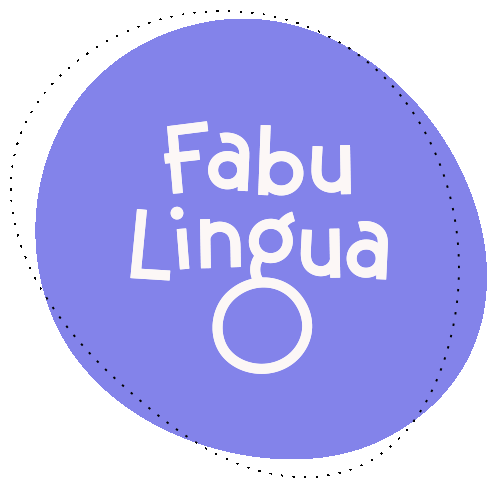What is the difference between FabuLingua and Duolingo?
There’s a lot of language learning platforms out there - DuoLingo, Babbel, Rosetta Stone - but how can you know which is the best? And how can you know if any of these will work for your kids?
Duolingo is currently the most well-known language learning platform out there, but why is it not as effective as it should be?
While Duolingo will help you get familiar with a language, it’s lacking in the science-backed qualities that help people actually acquire a language, especially children!
At FabuLingua, we pride ourselves in implementing science-backed language acquisition research into our mobile game, and by doing so we hope to change the future of the language learning space.
Interested in helping your child learn a second language but still can’t decide which app to use? Here’s some ways FabuLingua stands against Duolingo:
1. FabuLingua’s Niche Focus on Early Childhood
Target Audience: Unlike Duolingo, which serves a broad audience of learners (from children to adults), FabuLingua is laser-focused on early childhood through elementary school language acquisition. Our deep expertise and specialization is in early language development, where tailored pedagogy is essential.
Educational Psychology: Our methods are designed specifically for young learners. For instance, FabuLingua is centered around narrative and story-based learning, which is well-aligned with children’s cognitive development stages. Young children learn best through stories, play, and context-rich environments rather than through formal instruction.
2. Our Unique Learning Approach (Comprehensible Input in a Story-Based Pedagogy)
Comprehensible Input: A major distinction is FabuLingua’s use of interactive stories rooted in Stephen Krashen’s “comprehensible input” theory. This scientifically-backed approach focuses on immersive, natural language exposure, making FabuLingua more effective for young children. This is not just a fun, gamified experience, but a pedagogically superior method for language acquisition in young children!
Engaging and Immersive: While Duolingo uses a repetitive, quiz-based model that appeals more to adult learners or older students, FabuLingua offers an immersive and engaging storytelling approach, which is proven to be more suitable for kids. Storytelling is also emotionally engaging, helping children connect with the language on a deeper level.
3. Teacher and Classroom Integration
Teacher Dashboard and School Partnerships: FabuLingua’s success with now more than 2,000 teacher accounts and the Teacher Dashboard positions it as a tool that supports educators in classroom environments. Duolingo is more focused on individual learners, while FabuLingua supports both home learning and structured classroom use, making it a versatile tool for both parents and educators.
Educational Alignment: FabuLingua aligns with curriculum goals and developmental milestones in early childhood education. By focusing on how teachers use the platform, FabuLingua is a tool that is adopted not just for individual use, but also in educational settings—a market segment Duolingo has not extensively pursued.
4. Leverage AI and Adaptive Learning Capabilities
Data-Driven Personalization: One of FabuLingua’s planned strengths is its use of AI to create adaptive learning paths tailored to individual children’s needs. This type of adaptive learning technology allows for a personalized experience based on each child’s progress, interests, and performance, something that Duolingo’s standard model cannot easily offer. FabuLingua is not only a language learning tool but also a personalized educational experience that evolves with the child.
AI-Enhanced Content Development: FabuLingua is scaling content development through AI and will continue to grow its content library and adapt to evolving educational needs.
5. FabuLingua as a Complement to Broader Language-Learning Tools
Filling the gap: FabuLingua is complementary to Duolingo, not a direct competitor to it. For example, Duolingo might be more suited for adults or older learners who are seeking to learn grammar and vocabulary, while FabuLingua is the go-to platform for foundational language learning in children. FabuLingua fills a gap in the market for age-appropriate, foundational language education, where generalist platforms like Duolingo may not be as effective.
FabuLingua’s Learning Path
Lifelong Language Learning: FabuLingua is part of a lifelong language learning journey. We provide the foundational early learning that prepares children for more advanced tools (such as Duolingo) as they grow older. FabuLingua is an essential first step in a child’s language journey.
6. FabuLingua’s Proprietary IP (Patent-Backed Methodology)
Magical Translations®: FabuLingua's proprietary, patent-backed approach to language learning is a key differentiator for educators and parents. Thoughtfully researched and conceived, FabuLingua is a cutting edge solution for language acquisition for young children.
On top of this, our proprietary stories, interactive experiences, and learning methods set FabuLingua apart.
7. FabuLingua’s Cultural and Linguistic Breadth
Storytelling from Diverse Cultures: FabuLingua offers stories from various cultural backgrounds. Our diverse linguistic and cultural stories provide an enriching, culturally aware language-learning tool, which resonates with parents and teachers focused on a well-rounded, global education.
—
So, while we don’t necessarily view ourselves as a direct competitor to DuoLingo, we do believe that we provide a unique, science-backed approach that sets ourselves apart from any other “competitor” out there.
FabuLingua is the leading mobile game-based language learning platform for children, combining interactive storytelling with research-backed pedagogy tailored to early childhood development. While platforms like Duolingo cater to a broad audience, FabuLingua focuses exclusively on the critical early years of language acquisition.
Trusted by over 1,800 teachers and 90,000 students, FabuLingua empowers children with an immersive and engaging approach to learning new languages, both in the classroom and at home. Our patent-backed methodology ensures children build strong linguistic foundations that set the stage for lifelong learning.
If you want your child to learn a second language, FabuLingua is the most-effective solution out there.
Want to learn more about FabuLingua? Try it for free today!




